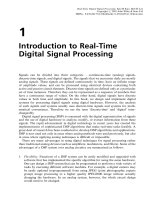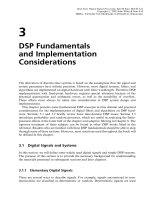Signal constellation diagram
Bạn đang xem bản rút gọn của tài liệu. Xem và tải ngay bản đầy đủ của tài liệu tại đây (212.85 KB, 18 trang )
CONTENTS
Introduction
Basic Concepts of Digital to analog modulation
PSK
QAM
Introduction
What is Signal Constellation diagram ?
. Representation of signal modulated by a digital
modulation.
. They also help you visually understand how a
particular modulation mechanism works.
. Bit rate
. Baud rate
Digital to Analog Modulation
Is the process of changing one of the
characteristics of an analog signal based on
information in a digital signal(0s and 1s).
Example data from computer to another across
a public access phone line.
Amplitude , frequency and phase.
Types of digital/analog
modulation
Phase Shift keying(PSK)
Phase of the carrier is varied to represent
binary 1 or 0.
Phase of 0 degrees to represent binary 0.
Phase to 180 degrees to send binary 1.
Conceptual view of PSK
PSK Constellation
4PSK- Conceptual view
4-PSK Constellation
diagram
8 PSK
When we have eight possible phases ,we can
send three bits at a time.
8-PSK is three times faster than 2-PSK
Three bit represents by each phase is called a
tribit.
8-PSK Constellation diagram
Quadrature Amplitude
Modulation
PSK is limited by the ability of the equipment .
This factors limits its potential bit rate.
Combine ASK and PSK.
Then we have maximum contrast between
each bit
QAM Constellations
4- QAM
8-QAM
Time domain for an 8-
QAM
16- QAM Constellation
Bit and Baud comparison
Why are constellation maps
or diagrams useful?
They help you design a transmission system
that is less prone to errors and can possibly
recover from transmission problems without
relying on higher level protocols.
The analysis of a transmission system's
constellation map allows the development of
error detection and error correction schemes
that can detect transmission problems.
Thanks
Indian Elango









